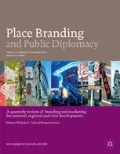Abstract
Public diplomacy (PD) is an activity which has become central to the analysis of modern diplomacy. Yet while there are common definitions of PD widely used internationally, practice between states has come to diverge more and more. There is disagreement in the academic literature about what should be included in PD activities, the actors, and boundaries. But there is little analysis of the effects of PD on mainstream diplomacy. This paper, written by a diplomat and sometime practitioner of PD, argues that PD is losing its connection with wider diplomacy which is based on reciprocity and consensus-building. The digital revolution has enabled PD self-promotion which diminishes the necessity for diplomatic partnering. Global rivalries are played out daily for global publics with little room for quiet reflection and compromise. Such self-centered PD has immersed itself in the confusing and divisive nature of online engagement. While the Internet has brought massive benefits and opportunities to both diplomacy and PD, the consensus-building part of true diplomatic engagement is receding. The activities of ISIS and Russia were just the first major collective challenges to diplomacy through new PD techniques. In the past, diplomacy has responded to crises and conflicts and rebuilt its options. Now PD’s chaotic and troubling evolution needs a new response. This should include partners in the non-state sector and the owners of technology platforms. The article takes a practitioner’s perspective and proposes a forum where state and non-state experts could discuss appropriate collective responses by diplomacy so it can reassert options available for consensus-building.
Similar content being viewed by others
Notes
Pew Global Research https://www.pewglobal.org/2017/06/26/tarnished-american-brand/.
Russia’s Place in a Changing World, http://worldmeets.us/Moskovskiye.Novosti000001.shtml#axzz5JpQ0vO7N.
8 Crazy Things Americans Believe about Foreign Policy : Foreign Policy October 2012 https://foreignpolicy.com/2012/10/16/8-crazy-things-americans-believe-about-foreign-policy.
Our World in Data: TRUST Esteban Ortiz-Espina and Max Rosser, https://ourworldindata.org/trust.
How to Fix What Has Gone Wrong with the Internet The Economist June 28th 2018. https://www.economist.com/special-report/2018/06/28/how-to-fix-what-has-gone-wrong-with-the-internet.
References
Allison, Graham. 2017. The Thucydides Trap. New York: Foreign Policy.
Ayhan, Kadir Jun. 2019. The Boundaries of Public Diplomacy and Nonstate Actors: A Taxonomy of Perspectives. International Studies Perspectives 20 (1): 63–83.
Bjola, Corneliu, and Lu Jiang. 2015. Social Media and Public Diplomacy: A Comparative Analysis of the Digital Diplomatic Strategies of the EU, U.S. and Japan in China. In From Digital Diplomacy: Theory and Practice, ed. Corneliu Bjola and Marcus Holmes. New York: Routledge.
Bremmer, Ian. 2018. US vs Them: The Failure of Globalism. New York: Portfolio.
Castells, Manuel. 2007. Communication, Power and Counter Power in the Network Society. International Journal of Communication. 1: 246.
Copeland, Daryl. 2009. Guerrilla Diplomacy: Rethinking International Relations, United States. Boulder: Lynne Rienner.
CRS Report to CONGRESS. 2011. US Public Diplomacy: Background and 9/11 Commission Recommendations, page 4.
Cull, Nicholas J. April 2006. Public Diplomacy” Before Gullion: The Evolution of a Phrase. https://uscpublicdiplomacy.org/blog/public-diplomacy-gullion-evolution-phrase.
Duncombe, Constance. 2017. Twitter and Transformative Diplomacy: Social Media and Iran–US Relations. International Affairs 93 (3): 545–562.
Erlanger, Steven. 8 March, 2017. What is RT? New York Times. https://www.nytimes.com/2017/03/08/world/europe/what-is-rt.htm.
Fuchs, Christian. 2014. Social Media and the Public Sphere. https://www.triple-c.at/index.php/tripleC/article/view/552/668.
Gilboa, Eyrton. 2008. Searching for a Theory of Public Diplomacy. Annals of the American Academy of Political and Social Science 616: 55–77.
Giles, Keir. 2016. Handbook on Russian Information Warfare. Roma: Nato Defense College.
Greenwood, Max. 1 May 2018. The Hill, http://thehill.com/homenews/administration/385726-pompeo-issues-first-tweets-as-secretary-of-state.
Gregory, Bruce. 2008. Public Diplomacy and National Security: Lessons from the U.S. Experience. Small Wars Journal, August 15.
Haass, Richard. 2018. A World in Disarray, American Foreign Policy and the Crisis of the Old Order. London: Penguin Press.
Hartig, Falk. 2016. How China Understands Public Diplomacy: The Importance of National Image for National Interests. International Studies Review 18 (4): 655–680.
Houndshell, Blake. 20 June 2011. Epiphanies from Henry Kissinger, Foreign Policy. https://foreignpolicy.com/2011/06/20/epiphanies-from-henry-kissinger/.
Jinping, Xi. September 2017. President Xi Jinping Talking to BRICS Business Leaders. https://www.newsmax.com/t/newsmax/article/811420?section=newsfront&keywords=xi-jinping-china-leader-world-peace&year=2017&month=09&date=03&id=811420&aliaspath=%2FManage%2FArticles%2FTemplate-Main.
La Porte, Teresa. 2012. The Impact of Intermestic Non-State Actors on the Conceptual Framework of Public Diplomacy. The Hague Journal of Diplomacy. 7 (4): 441–458.
Lukyanov, Fyodor. Why Russia’s Soft Power is Too Soft. http://eng.globalaffairs.ru/redcol/Why-Russias-Soft-Power-Is-Too-Soft-15845.
MacMillan, Margaret. 2018. Reith lectures. http://downloads.bbc.co.uk/radio4/reith2018/Reith_2018_MacMillan_lecture_1.pdf.
Manor, Ilan. 27 June 2018. How Diplomats Can Combat Digital Propaganda, Global Policy Opinion. https://www.globalpolicyjournal.com/blog/27/06/2018/how-diplomats-can-combat-di.
Pamment, James. 2014. Mediatization of Diplomacy. The Hague Journal of Diplomacy 9 (3): 253–280.
Pamment, James. 2016. British Public Diplomacy and Soft Power, 211–213. Basingstoke: Palgrave Macmillan.
People’s Daily Online. 21 May 2015. http://en.people.cn/n/2015/0521/c98649-8895293.html.
Powers, Shawn. 2017. Valuing Public Diplomacy, https://uscpublicdiplomacy.org/blog/valuing-public-diplomacy.
Putin’s. 2007. Prepared Remarks. Munich Security Conference http://www.washingtonpost.com/wp-dyn/content/article/2007/02/12/AR2007021200555.html.
Rawnsley, Gary. 2008. China Talks Back: Public Diplomacy and Soft Power for the Chinese Century. In Routledge Handbook on Public Diplomacy, ed. Nancy Snow and Philip M. Taylor. New York: Routledge.
Riordan, Shaun. 2019. Cyber Diplomacy, Managing Security and Governance Online. Cambridge, UK: Polity Press.
Shambaugh, David. 2015. China’s Soft Power Push https://www.foreignaffairs.com/articles/china/2015-06-16/china-s-soft-power-push.
Simons, Greg. 2014. Russian Public Diplomacy in the 21st Century: Structure, Means and Message. Public Relations Review. https://doi.org/10.1016/j.pubrev.2014.03.002.
Simons, Greg. 2018. The Role of Russian NGOs in New Public Diplomacy. Journal of Political Marketing 17 (2): 137–160.
Winter, Charlie, and Jordan Bach-Lombardo ‘Why ISIS propaganda Works’, The Atlantic. https://www.theatlantic.com/international/archive/2016/02/isis-propaganda-war/462702/.
Wiseman, Geoffrey. 2004. “‘Polylateralism” and New Modes of Global Dialogue’. In Diplomacy, vol. III, ed. Christer Jonsson and Richard Langhorne, 36–57. London: Sage.
Author information
Authors and Affiliations
Corresponding author
Additional information
Publisher's Note
Springer Nature remains neutral with regard to jurisdictional claims in published maps and institutional affiliations.
Rights and permissions
About this article
Cite this article
Hare, P.W. Corroding consensus-building: how self-centered public diplomacy is damaging diplomacy and what can be done about it. Place Brand Public Dipl 16, 153–164 (2020). https://doi.org/10.1057/s41254-019-00137-3
Revised:
Published:
Issue Date:
DOI: https://doi.org/10.1057/s41254-019-00137-3




